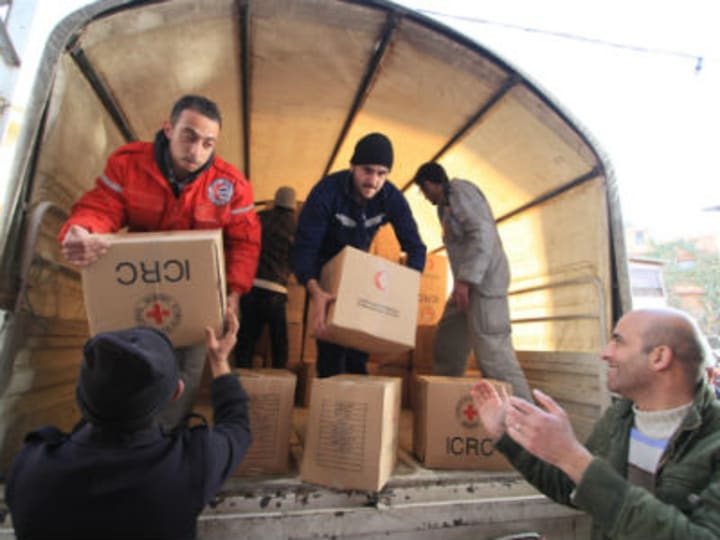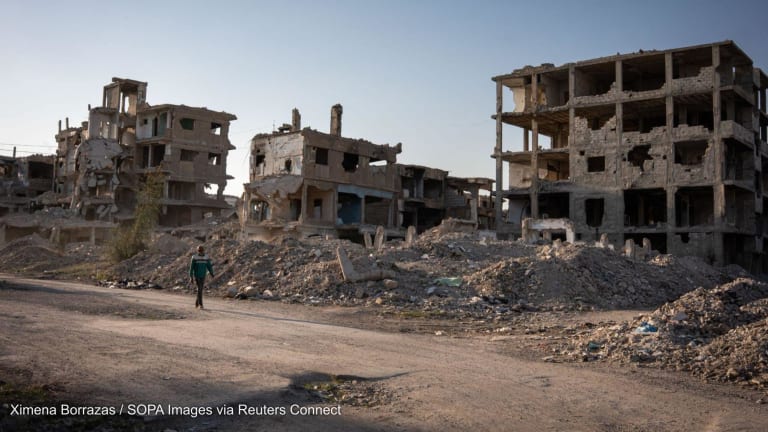
Many aid groups responding to the Syrian crisis have continually voiced concerns on funding and access inside the country, but one particular aid group is facing a different dilemma.
The Syrian Arab Red Crescent has been one of the main organizations delivering assistance to many affected Syrians all over the country since the conflict erupted in 2011. The government has limited access for many international NGOs, leading some to operate without government authorization.
The organization works in both government-held and rebel-controlled areas, as part of its mandate to help people based on need alone, but that has created a challenge to building credibility in such a polarized nation, according to head of operations Khaled Erkssousi.
“People cannot grasp or they don’t want to get the idea that we, an organization in Syria, could be neutral, could operate in areas of the regime and opposition, [but] are not with either,” Erkssousi told Devex.
Indeed, the SARC has been strongly criticized for being too close to the regime, no matter how many times the aid group has insisted that it doesn’t take sides.
“The idea is very strange. On the ground, it doesn’t make sense. Because how we operate and what we do, it’s always to the benefit of the people in need,” Erkssousi argued.
This negative attention, which he pointed out is in part due to the media, has created its own set of problems for the organization. One in particular is funding.
Donor aid
The sometimes negative depiction of the SARC in the news has given way to the organization receiving less support than other aid groups, Erkssousi claimed.
“Support may be going to entities, other organizations, that may have a maybe more positive depiction. But it’s only a depiction,” he argued.
The organization receives most of its operational funding from national societies through the IFRC and sister organization ICRC. It doesn’t depend on the U.N. appeal, which reached some $5 billion in June. Some 28 percent of that appeal was for activities within Syria.
The humanitarian, however, is not forcing donors, some of them he says maybe looking for “media exposure,” to donate to the SARC, but cautions them against just disbursing money without knowing how it’s being spent.
“There are some NGOs or entities who claim they work and deliver, but when we have had a chance to look at their reports, at their numbers, it’s a shame.”
Erkssousi advised donors to do more serious auditing.
“We have to raise our voice even if the aid is not coming through us. It’s coming through somebody else, but if that somebody else is not efficient enough or is reeling far or wasting money, we all should speak out because people in need, they won’t have a loud voice,” he explained.
“We dont claim we could reach 100 percent of the areas in Syria. This will be nonsense. But we can reach 90 or 85 percent,” he said.
Protection boost
According to Erkssousi, volunteers are sometimes affected by how the organization is depicted in the media as well.
“Some things in the media affect the morale and in fact the safety of volunteers, because people who are not educated enough, they hear something on TV, and they take it for granted. And while on TV it can cost some time and electricity to say this, on our end, it may cost us bullets,” he said.
The killing of volunteers is perhaps one of the biggest blows to the organization, which has lost 20 volunteers since the crisis erupted almost three years ago. Some volunteers even remain in detention.
Unlike other aid groups, SARC volunteers have nowhere to fled in the face of insecurity, as volunteers themselves come from the communities.
Erkssousi notes the SARC leadership always tells volunteers to “keep your eye on the goal, you keep your mind straight. It doesn’t matter what they say out there, because what they say out there is very political … [And] you don’t want to enter that debate.”
The organization has traditionally relied on local knowledge of the SARC for its protection, but recently, indiscriminate attacks — some brought about by groups “who don’t understand the basics of humanitarian work” and with whom it’s hard to negotiate with — have led them to consider greater physical protection, such as using body armors or helmets for volunteers.
The SARC is also hoping to receive new cars for critical missions in which it has to cross the frontlines.
“We recently received our first armored vehicle. Before that we don’t have any kind of physical protection — something that the U.N. enjoys in Syria,” he said.
This is particularly baffling given that the SARC is often the one helping facilitate movement for other NGOs, U.N. agencies and even the ICRC, having been able to establish what Erkssousi describes as “special trademark” across the country.
“Security checkpoints and police and others, they don’t know anybody other than the Red Crescent. So if they see another car, they would call us: Do you know about this car? Do you know about their movement? Do you guarantee that they are not carrying weapons or smuggling something. And we do that for them, for the UN, and even for shipping companies shipping materials for the UN and other NGOs.”
Painful ordeal
Erkssousi started volunteering for the organization in 1991, and had spent over ten years working for the SARC when two million Iraqis crossed over to Syria in 2002, or when four years later half a million Lebanese also poured in fearing the war with Israel.
In both instances, the organization never made an international appeal or erected camps for the refugees.
“I was at the Lebanese border in 2006, receiving the Lebanese and giving them water. And Syrian families were standing in queus on the Lebanese border to take Lebanese families and host them,” recalled Erkssousi.
But now, his fellow Syrians are the ones that need assistance, and it pains him that his people do not seem to be getting the same warm reception they provided years back.
“It really hurts when you hear some of the Jordanians, Lebanese or Iraqis or surrounding countries complaining or making sectarian issues about the Syrian refugees.”
He hopes people from these countries, in particular in Lebanon where there now appears more than 500,000 refugees, would not “treat the Syrians as second-level humans.”
As a humanitarian, he hopes the fighting would soon stop. But this is wishful thinking, he admits: “It doesn’t look like [the conflict is] something that’s going to end soon.”
In the meantime, he calls on the international community to not mix humanitarian work with politics.
“Those are two different issues in fact, and they contradict each other. If you supply more guns, we must supply more humanitarian aid, because it will cause more people to flee and become IDPs or refugees.”
Read more development aid news online, and subscribe to The Development Newswire to receive top international development headlines from the world’s leading donors, news sources and opinion leaders — emailed to you FREE every business day.




